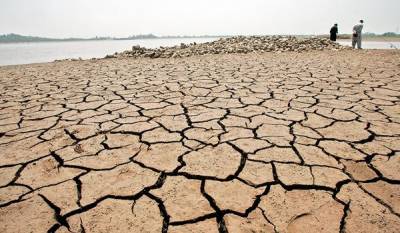Web Desk
Pakistan is among 23 countries which are facing drought emergencies over the past two years, according to the ‘Global Land Outlook’ report released by the United Nations.
The report released by the United Nations Convention to Combat Desertification (UNCCD) says that over the past century, the highest total number of humans affected by drought was in Asia.
The 23 countries listed by the report include Afghanistan, Angola, Brazil, Burkina Faso, Chile, Ethiopia, Iran, Iraq, Kazakhstan, Kenya, Lesotho, Mali, Mauritania, Madagascar, Malawi, Mozambique, Niger, Somalia, South Sudan, Syria, Pakistan, the United States and Zambia.
The report predicts the outcomes by 2050 and risks involved, and says by 2050, an additional 4 million square kilometers of natural areas, equivalent to the size of India and Pakistan, would require restoration measures, augmented with protection measures of areas important for biodiversity, water regulation, conservation of soil and carbon stocks, and provision of critical ecosystem functions.
Up to 40 per cent of the planet’s land is degraded, directly affects half of humanity, threaten roughly half of global GDP worth $44 trillion. If business as usual continued through 2050, the report projects additional degradation of an area almost the size of South America.
The report says nations’ current pledge to restore one billion degraded hectares by 2030 requires $1.6 trillion this decade — a fraction of today’s annual $700 billion in fossil fuel and agricultural subsidies.
The report warns that at no other point in modern history has humanity faced such an array of familiar and unfamiliar risks and hazards, interacting in a hyper-connected and rapidly changing world.
Many traditional and modern regenerative food production practices can enable agriculture to pivot from being the primary cause of degradation to the principal catalyst for land and soil restoration, the report says.
Poor rural communities, smallholder farmers, women, youth, indigenous peoples, and other at-risk groups are disproportionately affected by desertification, land degradation, and drought. At the same time, traditional and local knowledge of indigenous peoples and local communities, proven land stewards, represent a vast store of human and social capital that must be respected and can be used to protect and restore natural capital.
Immediate financial support is needed to fund conservation and restoration in those developing countries with a greater share of the global distribution of intact, biodiverse, and carbon-rich ecosystems, the report emphasised.
The report warns that if current land degradation trends continue, food supply disruptions, forced migration, rapid biodiversity loss and species extinctions will increase, accompanied by a higher risk of zoonotic diseases like Covid-19, declining human health, and land resource conflicts.
Many regenerative agriculture practices have the potential to increase crop yields and improve their nutritional quality while reducing greenhouse gas emissions and drawing down carbon from the atmosphere, it says.















